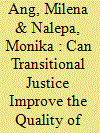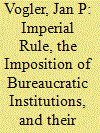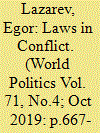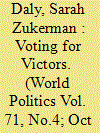|
|
|
Sort Order |
|
|
|
Items / Page
|
|
|
|
|
|
|
| Srl | Item |
| 1 |
ID:
169489


|
|
|
|
|
| Summary/Abstract |
Can transitional justice enhance democratic representation in countries recovering from authoritarian rule? The authors argue that lustration, a policy that reveals secret collaboration with the authoritarian regime, can prevent former authoritarian elites from extorting policy concessions from past collaborators who have been elected as politicians in the new regime. Absent lustration, former elites can threaten to reveal information about past collaboration unless the politicians implement policies these elites desire. In this way, lustration policies enable politicians to avoid blackmail and to be responsive to their constituents, improving the quality of representation. The authors show that whether lustration enhances representation depends on its severity and the extent to which dissidents-turned-politicians would suffer if the skeletons in their closets were revealed. The authors also find that the potential to blackmail politicians increases as the ideological distance between authoritarian elites and politicians decreases. They test this theory with original data from the Global Transitional Justice Dataset, which spans eighty-four countries that transitioned to democracy since 1946.
|
|
|
|
|
|
|
|
|
|
|
|
|
|
|
|
| 2 |
ID:
169493


|
|
|
|
|
| Summary/Abstract |
Significant variation in the institutions and efficiency of public bureaucracies across countries and regions are observed. These differences could be partially responsible for divergence in the effectiveness of policy implementation, corruption levels, and economic development. Do imperial legacies contribute to the observed variation in the organization of public administrations? Historical foreign rule and colonization have been shown to have lasting effects on legal systems, political institutions, and trade in former controlled territories. Imperial legacies could also explain variations in the performance of public administrations. The author uses the case of Poland to investigate the long-term effects of foreign rule on bureaucratic systems. Historically, Poland was split between three imperial powers with very different public administrations: Prussia, Austria, and Russia. Statistical analyses of original data collected through a survey of more than 650 Polish public administrations suggest that some present-day differences in the organization and efficiency of bureaucracies are due to imperial legacies.
|
|
|
|
|
|
|
|
|
|
|
|
|
|
|
|
| 3 |
ID:
169490


|
|
|
|
|
| Summary/Abstract |
How do legacies of conflict affect choices between state and nonstate legal institutions? This article studies this question in Chechnya, where state law coexists with Sharia and customary law. The author focuses on the effect of conflict-induced disruption of gender hierarchies because the dominant interpretations of religious and customary norms are discriminatory against women. The author finds that women in Chechnya are more likely than men to rely on state law and that this gender gap in legal preferences and behavior is especially large in more-victimized communities. The author infers from this finding that the conflict created the conditions for women in Chechnya to pursue their interests through state law—albeit not without resistance. Women’s legal mobilization has generated a backlash from the Chechen government, which has attempted to reinstate a patriarchal order. The author concludes that conflict may induce legal mobilization among the weak and that gender may become a central cleavage during state-building processes in postconflict environments.
|
|
|
|
|
|
|
|
|
|
|
|
|
|
|
|
| 4 |
ID:
169491


|
|
|
|
|
| Summary/Abstract |
Modern clientelist exchange is typically carried out by intermediaries—party activists, employers, local strongmen, traditional leaders, and the like. Politicians use such brokers to mobilize voters, yet little about their relative effectiveness is known. The authors argue that broker effectiveness depends on their leverage over clients and their ability to monitor voters. They apply their theoretical framework to compare two of the most common brokers worldwide, party activists and employers, arguing the latter enjoy numerous advantages along both dimensions. Using survey-based framing experiments in Venezuela and Russia, the authors find voters respond more strongly to turnout appeals from employers than from party activists. To demonstrate mechanisms, the article shows that vulnerability to job loss and embeddedness in workplace social networks make voters more responsive to clientelist mobilization by their bosses. The results shed light on the conditions most conducive to effective clientelism and highlight broker type as important for understanding why clientelism is prevalent in some countries but not others.
|
|
|
|
|
|
|
|
|
|
|
|
|
|
|
|
| 5 |
ID:
169492


|
|
|
|
|
| Summary/Abstract |
Why do citizens elect political actors who have perpetrated violence against the civilian population? Despite their use of atrocities, political parties with deep roots in the belligerent organizations of the past win postwar democratic elections in countries around the world. This article uses new, cross-national data on postwar elections globally between 1970 and 2010, as well as voting, survey, archival, and interview data from El Salvador. It finds that belligerents’ varied electoral success after wars can be explained not by their wartime levels of violence or use of electoral coercion, but by the distribution of military power at the end of conflict. It argues that militarily stronger belligerents are able to claim credit for peace, which translates into a reputation for competence on the provision of security. This enables them to own the security valence issue, which tends to crosscut cleavages, and to appeal to swing voters. The stronger belligerents’ provision of security serves to offset and justify their use of atrocities, rendering their election rational. This article sheds light on political life after episodes of violence. It also contributes to understanding security voting and offers insights into why people vote in seemingly counterintuitive ways.
|
|
|
|
|
|
|
|
|
|
|
|
|
|
|
|
|
|
|
|
|